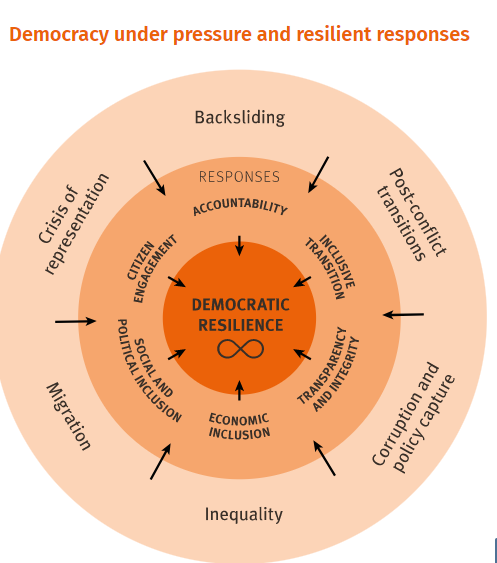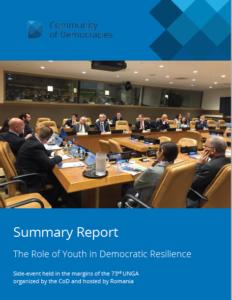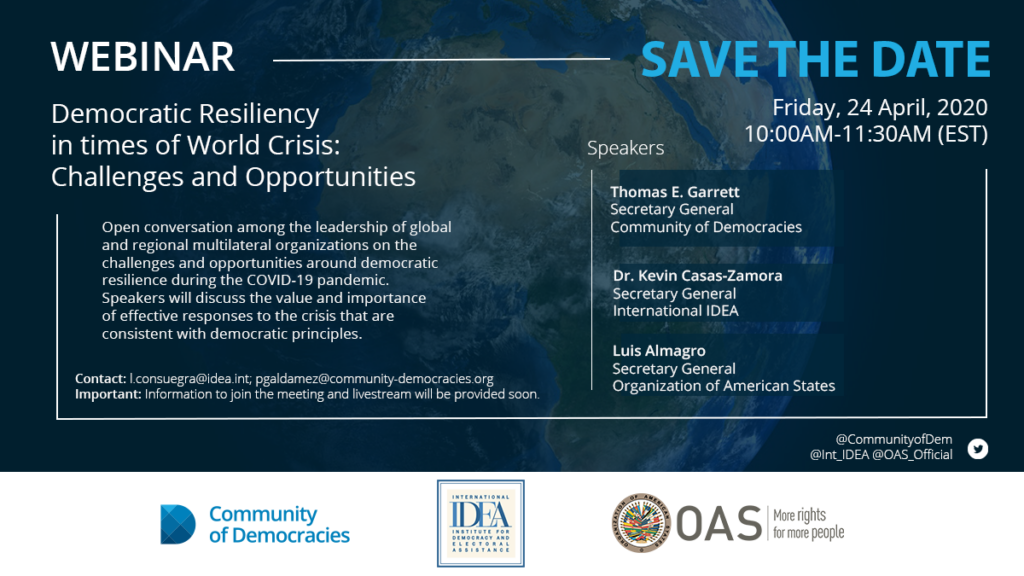
International IDEA
Expanding established State Department-funded National Endowment for Democracy (NED) fellowships and exchange programs should be part of a revamp of U.S. democracy assistance, argues Mason Ingram, global governance director at Pact.
There are multiple opportunities for U.S. policymakers and implementers of democracy assistance to signal their commitment symbolically and substantively to a vigorous pro-democracy agenda that is based on common interests and mutual respect, he writes for Devex. Elements of such an approach could include the following:
• Ensure alignment of U.S. democracy assistance and pro-democracy diplomacy. A unified, whole-of-government pro-democracy policy will give democratic champions receiving assistance from USAID or other agencies the assurance that the full weight of the U.S. government is aligned with their values and interests. Full alignment of U.S. democracy assistance and diplomatic policies, however, requires elevating development within the interagency policymaking process.
 The nomination of Ambassador Samantha Power, herself a noted human rights advocate and veteran diplomat, and her full inclusion on the National Security Council provides an opportunity to ensure there is minimal daylight between our development and diplomatic agendas writ large, including as they relate to our global democracy assistance.
The nomination of Ambassador Samantha Power, herself a noted human rights advocate and veteran diplomat, and her full inclusion on the National Security Council provides an opportunity to ensure there is minimal daylight between our development and diplomatic agendas writ large, including as they relate to our global democracy assistance.
• Justify democracy assistance based on shared vulnerabilities. Investments in global health and international environmental programming are routinely justified based on our shared vulnerability to infectious disease, climate change, and any number of other risks with recipient countries. Moving forward, we should likewise justify democracy assistance based on the common challenges we face in preserving democratic institutions and maintaining a healthy political culture.
• Embrace mutualism and exchange. U.S. government policymakers and implementing agencies alike should double down on programs that promote exchange among democracy and human rights champions, including initiatives that support learning between actors in the U.S. and countries in the global south. This should include expanding established State Department National Endowment for Democracy fellowships and exchange programs. Implementers of democracy assistance programs should expand peer-to-peer mentorship and exchange initiatives — both south-to-south and south-to-north — as part of their empowerment toolkits. Exchange should be premised on mutualism, with an understanding that there is as much to learn by actors in the U.S. as anywhere.
President Biden this week underscored his desire to defend democratic institutions and norms around the world in a conversation with India’s Prime Minister Narendra Modi of India, The President further noted a shared commitment to democratic values as the bedrock for the U.S.-India relationship and both parties resolved that the rule of law and the democratic process must be upheld in Burma.
The task of reinforcing the resilience of global democracies is not a “Western” project, however, notes a recent Brookings report. In fact, the center of gravity in this burgeoning systems competition between democracy and authoritarianism may be the Indo-Pacific region.
 A growing disregard for the conditions that form the foundations of democracy—including respect for the rights of minorities and migrants, space for critical dissent, and commitment to the rule of law—threatens to destabilize the democratic order, according to a recent analysis from Freedom House.
A growing disregard for the conditions that form the foundations of democracy—including respect for the rights of minorities and migrants, space for critical dissent, and commitment to the rule of law—threatens to destabilize the democratic order, according to a recent analysis from Freedom House.
At the same time, prioritizing a narrow support base at the expense of ensuring fundamental freedoms for all, and neglecting to tie democratic principles to foreign policy, leaves democracies vulnerable to interference from authoritarian regimes, which have increased repression at home and abroad, it observed, adding several recommendations to renew democratic values and institutions.
To help advance that objective, the National Endowment for Democracy (NED) welcomes applications for its Grants Program. Through the program, grants averaging $50,000 will be awarded to nongovernmental organizations (including civic organizations, associations, and independent media) dedicated to advancing democratic goals and strengthening democratic institutions.
The organization is interested in proposals from nonpartisan programs that seek to promote and defend human rights and the rule of law; support freedom of information and independent media; strengthen democratic ideas and values; promote accountability and transparency; strengthen civil society organizations; strengthen democratic political processes and institutions; promote civic education; support democratic conflict resolution; promote freedom of association; and strengthen a broad-based market economy.
NED encourages applications from organizations working in diverse environments, including newly established democracies, semi-authoritarian countries, highly repressive societies, and countries undergoing democratic transitions. See the NED website for guidelines and application information. Deadline: March 26, 2021. Learn more and apply here.








